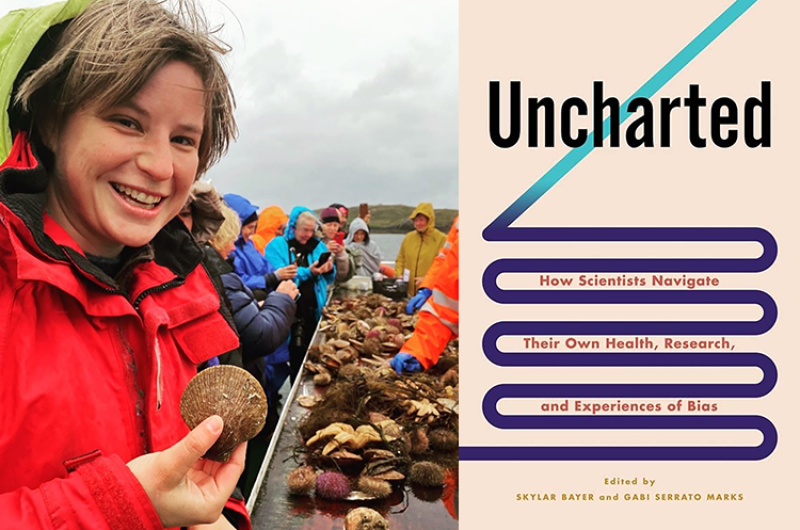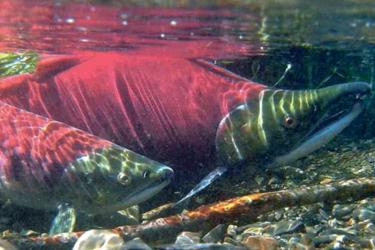In honor of National Disability Pride Month, the Alaska Region is highlighting the diverse work of biologist Dr. Skylar Bayer and her upcoming book on disabilities and chronic medical conditions in STEM fields. July is National Disability Pride Month, which commemorates the passing of the Americans with Disabilities Act on July 26, 1990. ADA prohibits discrimination against people with disabilities, including in employment, transportation, public accommodations, and communications, and in relation to access to state and local government services.
Dr. Bayer’s new book, Uncharted, is a collection of powerful first-person stories by current and former scientists with disabilities or chronic conditions who have faced changes in their careers, including both successes and challenges, because of their health.
What inspired you to write your book?
I wrote/performed a story about when I felt unimportant in graduate school because I could no longer scuba dive in my research lab. I had been diagnosed with a long-term heart condition that required the insertion of an implantable cardioverter-defibrillator. I also couldn't get my Coast Guard captain's license (I tried), and there are likely other things I cannot do anymore. My friend Erin Barker, who is the executive director for The Story Collider, suggested I get in touch with my co-editor Gabi Serrato Marks because she told a story about being disabled while conducting field work for her Ph.D. Gabi and I decided that we wanted to create a book with lots of contributors with disabilities and chronic medical conditions in STEM—both field and lab and everything in between. We wanted to share stories from scientists with disabilities and medical conditions because stories help audiences learn; they help tellers feel seen, and they help build community. I have learned a lot about storytelling and editing as a producer for The Story Collider—I train(ed) scientists and nonscientists on how to tell a story, and I've written a lot of stories myself. Gabi is a very good science communicator and writer, so together, we edited stories from more than 30 contributors to the book, Uncharted: How Scientists Navigate Their Own Health, Research, and Experiences of Bias. We also wrote this piece for Scientific American about disabilities making better scientists and the need for their support before we really got our book project going with Columbia University Press.
What is the key message you would like readers to take away from your book?
There is a huge diversity of experience out there by disabled scientists and that scientists are whole people—we are not just defined by our careers or our medical conditions or disability; our experiences are diverse but we all need support and community to thrive.
What office do you work for at NOAA and what is your key responsibility?
I work for the Alaska Regional Office in the Habitat Conservation Division. I work primarily on nearshore habitat science, but I am involved in projects and teams related to scallops, aquaculture, and communication.
Where did you grow up? Is there anything about your childhood or where you grew up that influenced your career path?
I grew up in Massachusetts. I think that going to Cape Cod and Martha's Vineyard for vacations in the summer helped maintain my interest in ocean science and marine biology. I have always had a strong interest in medical conditions and biology because the day after I was born, I had open heart surgery for a condition called "transposition of the great arteries." This means that my major arteries of my heart (one to the lungs, one to the rest of the body) were swapped and needed to be cut and sewn back into the right location.
What is your educational background?
I first went to Connecticut College in 2004, but then transferred a year later to Brown University where I received a B.Sc. in Marine Biology in 2008. I took a year off and then started a Ph.D. in Biological Oceanography in the Massachusetts Institute of Technology-Woods Hole Oceanographic Institute Joint Program in 2009, but decided to leave in 2011 with a M.Sc. in Biological Oceanography. I wanted to do more field work, and I also wanted to scuba dive more for my research. I took some of my grant money to start a Ph.D. at the University of Maine in 2011, and I graduated with a Ph.D. in Marine Biology in 2017. However, during the first 6 months of my program, I was diagnosed with a cardiac condition called polymorphic arrhythmia that resulted in the implantation of an defibrillator in my chest, and I was no longer allowed to scuba dive for research per rules and regulations of the American Academy of Underwater Sciences.
What do you like to do outside of work?
I like storytelling which is often melded into my science communication work. I also tell non-science stories and I’ve worked as a producer for The Story Collider since 2014. Most recently, I have told stories for the local group "Mudrooms" here in Juneau. Prior to that I’ve told stories in Washington, DC, Maine, Vermont, Boston, and New York City. I used to have a small podcast/radio show during graduate school when I lived in Maine, so I really enjoy audio/performative experiences. I'm hoping there will be more opportunity for those kinds of things here in Juneau as I get more integrated into the community.
I spend a lot of my time practicing Brazilian Jiu Jitsu; I'm a purple belt. I took a few years off during the pandemic, but I'm back at it.
I spend a lot of time with my dogs and husband going on hikes/walks. I also like to make collage art and create mystery/clue games for my niece and nephew. I take a lot of photos of landscapes mostly from my travels.
Is there a book, quote, or person that influenced you to be the person that you are today?
Well, there are probably a lot of people who influenced me to become who I am today. Definitely my parents—my mom was an editor and English teacher and my dad started his Ph.D. at MIT but didn't finish and became a computer programmer, so I feel like I'm both a scientist and a communicator. I really loved the book Contact by Carl Sagan. In high school, it was a really important piece that made me think a lot about what it means to be a human, a woman, and a scientist at the same time. I was a big fan of SeaQuest and Ocean Girl as a kid (those are both TV shows of the early 1990s) which I suppose really put me on the path to ocean science. I also think that having heart surgery as a newborn made me appreciate how short life is or can be and that I want to do what I think is important while I have the time to do so.
What does Disability Pride Month mean to you?
Disability Pride Month is a chance to celebrate disability in our world and not view disability as something to "overcome." Too often we think of disability as only a barrier to living instead of a different way of being in the world. Disability is a form of diversity, and diversity helps us problem solve better and create a world that strives to be inclusive and accessible to all. I think it's also a month to acknowledge that disability comes in many forms and is more common than we often acknowledge.
I really hope that readers who are early in their careers or have felt isolated in science feel seen or supported through the stories shared in this book. I hope that it's just one piece of a larger movement and body of work that makes STEM more inclusive for everyone. I want to see more stories shared from scientists with disabilities and medical conditions and also see them supported by their institutions, colleagues, and the field as a whole.



